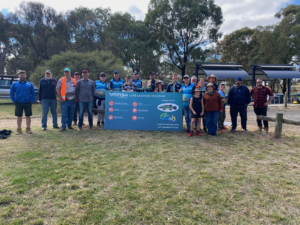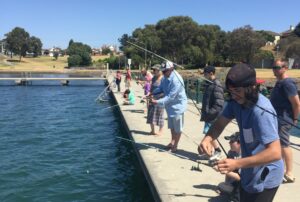
- Scientific Name
- Isurus oxyrinchus
- Size
- Up to 4m
- Lifespan
- Around 29 years
General Description
Shortfin makos are a popular game fishing shark, valued in Victoria for its good eating qualities. They are the world’s fastest shark capable of bursts of speed close to 80km/hr and are infamous for gigantic leaps out of the water.
The secret to their high activity and power lies within their ability to maintain a higher body temperature than the ambient water which is a common trait of the mackerel shark family, which also include white sharks.
They can live to at least 29 years old and grow to 4 metres in length. Females are thought to mature at 18 years of age, have a gestation period of 15-18 months and only pup (reproduce) every 2 to 3 years with an average of 12 pups per litter. At birth, shortfin makos are already around 70cm in length and have a fast initial growth rate reported at 42-61 cm per year as juveniles.
Where to Find
Shortfin makos have a worldwide distribution across temperate and tropical waters, however exist in several genetically distinct sub-populations. In Australia, they are found in all waters except for Torres Strait. They are generally encountered in waters warmer than 16 degrees Celsius and as deep as 600 metres. Tag and release studies have shown that makos travel vast distances. In 2013, eight shortfin makos were tagged in Victorian waters and travelled distances ranging from 1,734 km in 99 days and 37,846 km in 953 days.
Fishing Rules
Guidelines for Handling and Release
- Use non-offset circle hooks which are more likely to result in sharks being hooked in the jaw
- Use nylon coated leader material to protect the eyes and gills of the shark
- Minimise the fight time to maintain the shark in an active and healthy state when it is released.
- Where possible, keep the shark in the water during de-hooking and release.
- Move the vessel slowly forward as the line is retrieved prior to release. This aids gill ventilation and reduces the likelihood of rapid and multiple direction changes by the shark during removal of the fishing gear
(Adapted from Rogers and Bailleul, 2015)
References
Rogers, P. J. & Bailleul, F, (author.) & Victoria. Department of Economic Development, Jobs, Transport and Resources. Recreational Fishing Grants Program (sponsoring body.) & South Australian Aquatic Sciences Centre (issuing body.) (2015). Innovative ways to ensure the future sustainability of the recreational fishery for shortfin makos in Victoria : the state of Victoria, Department of Economic Development, Jobs, Transport & Resources Recreational Fishing Grants Program research report. SARDI Aquatic Sciences, West Beach, SA






